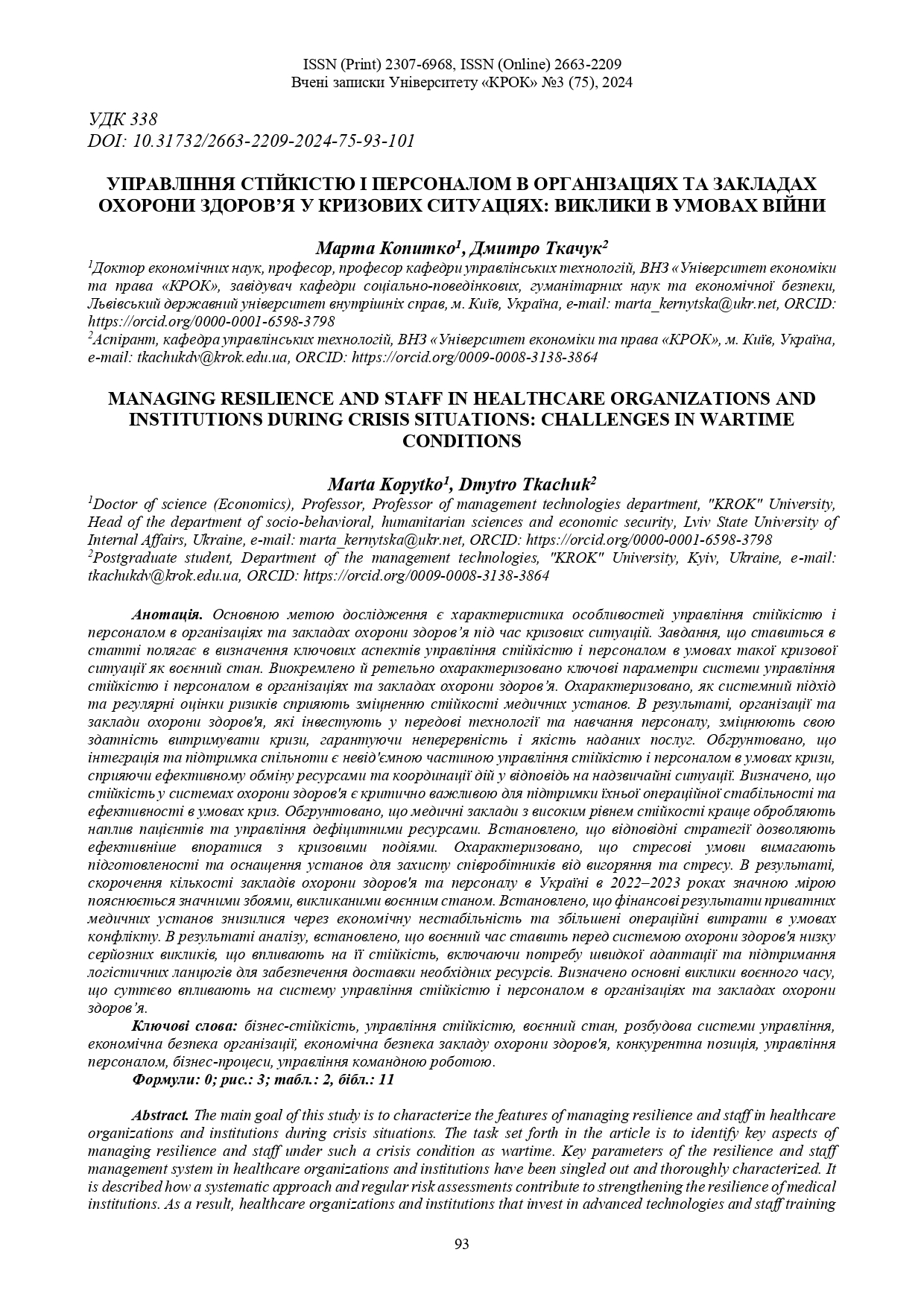MANAGING RESILIENCE AND STAFF IN HEALTHCARE ORGANIZATIONS AND INSTITUTIONS DURING CRISIS SITUATIONS: CHALLENGES IN WARTIME CONDITIONS
DOI:
https://doi.org/10.31732/2663-2209-2024-75-93-101Keywords:
business resilience, resilience management, state of war, development of management systems, economic security of the organization, economic security of the healthcare institution, competitive position, personnel management, business processes, management of teamworkAbstract
The main goal of this study is to characterize the features of managing resilience and staff in healthcare organizations and institutions during crisis situations. The task set forth in the article is to identify key aspects of managing resilience and staff under such a crisis condition as wartime. Key parameters of the resilience and staff management system in healthcare organizations and institutions have been singled out and thoroughly characterized. It is described how a systematic approach and regular risk assessments contribute to strengthening the resilience of medical institutions. As a result, healthcare organizations and institutions that invest in advanced technologies and staff training enhance their ability to withstand crises, ensuring continuity and quality of services provided. It is argued that community integration and support are an integral part of managing resilience and staff during crises, facilitating effective resource sharing and coordination of actions in response to emergencies. It has been determined that resilience in health care systems is critically important for maintaining their operational stability and efficiency in crisis conditions. It is substantiated that medical institutions with a high level of resilience better manage the influx of patients and the management of scarce resources. Appropriate strategies have been found to more effectively cope with crisis events. It is characterized that stressful conditions require preparedness and equipment of institutions to protect employees from burnout and stress. As a result, the reduction in the number of health care facilities and staff in Ukraine in 2022–2023 is largely explained by significant disruptions caused by the state of war. It has been established that the financial results of private medical institutions have declined due to economic instability and increased operational costs in conflict conditions. As a result of the analysis, it has been established that wartime poses a number of serious challenges to the health care system that affect its resilience, including the need for rapid adaptation and maintenance of logistic chains to ensure the delivery of necessary resources. The main challenges of wartime that significantly affect the system of managing resilience and staff in healthcare organizations and institutions have been identified.Downloads
References
Козирєва П.В. Аналіз та стратегії управління ризиками в системі охорони здоров'я. Управління закладами охорони здоров'я. 2022. №2. С.37-43.
Бондаренко Н.Є. Системні підходи до забезпечення стійкості медичних установ у надзвичайних ситуаціях. Журнал медичного права. 2018. №6. С.52-57.
Шапурова О.О.Моделі оцінки банкрутства та кризового стану підприємств. Економіка та держава. 2009. №4. С.59-64.
Савченко М. В. Розвиток категоріального базису «економічна стійкість». Галицький економічний вісник, 2019. № 2. С. 5-17.
Alazzam, F. A. F., Tubishat, B. M. A.-R., Savchenko, O., Pitel, N., & Diuk, O. Formation of an innovative model for the development of e-commerce as part of ensuring business economic security. Business: Theory and Practice, 24(2), 2023, 594–603.
Sylkin, O., Shtangret, A., Ogirko, O., & Melnikov, A. Assessing the financial security of the engineering enterprises as preconditions of the application of anti-crisis management: Practical aspect. Business and Economic Horizons (BEH), 14(4), 2018, 926–940.
Kopytko, M., Fleychuk, M., Veresklia, M., Petryshyn, N., & Kalynovskyy, A. Management of security activities at innovative-active enterprises. Business: Theory and Practice, 22(2), 2021, 299-309.
Alazzam, F. A. F., Tubishat, B. M. A.-R., Storozhuk, O., Poplavska, O., & Zhyvko, Z. Methodical approach to the choice of a business management strategy within the framework of a change in commercial activities. Business: Theory and Practice, 25(1), 2024, 1–10.
Kopytko, M., & Sylkin, O. Modelling information support for combating corruption in the economic security management system of the state. Social and Legal Studios, 6(3), 2023, 60-66.
Литвиненко І.Л. Інноваційні методики в оцінці ефективності роботи закладів охорони здоров'я в умовах кризи. Наукові вісті. 2020. №1. С.78-85.
State Statistics Service. URL : https://www.ukrstat.gov.ua/ (дата звернення 17.08.2024)

Downloads
Published
How to Cite
Issue
Section
License

This work is licensed under a Creative Commons Attribution-NonCommercial 4.0 International License.

